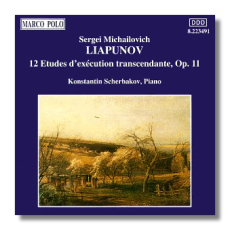
The Internet's Premier Classical Music Source
Related Links
- Latest Reviews
- More Reviews
-
By Composer
-
Collections
DVD & Blu-ray
Books
Concert Reviews
Articles/Interviews
Software
Audio
Search Amazon
Recommended Links
Site News
 CD Review
CD Review
Sergei Mikhailovich Lyapunov

Transcendental Studies
- Twelve Transcendental Studies, Op. 11 (1897-1905)
Konstantin Scherbakov, piano
Marco Polo 8.223491 DDD 71:12
Horowitz complained at one point that today's young virtuosi played "like typewriters" – all technique and no musicality. But over the last few years there has emerged a new breed of pianist that would have put his mind at rest, a clutch of players who know no technical terrors and whose musicality is evident from the first bar; to judge from recent recordings, the leaders of this admirable pack are Marc-André Hamelin, Carlo Grante and Rian de Waal. Now here comes another name to be added to the list – the 31-year-old, SIbérian-born Konstantin Scherbakov, garlanded with a sheaf of prizes and occupied between concerts with a teaching post at the Moscow Conservatory. Scherbakov tackles the outrageous pianistic hurdles of Lyapunov's Twelve Transcendental Studies, Op. 11, with utter assurance and an insight into the music that predicts a glittering career. I had never heard of his name before this recording, but I now have no doubt that he is an outstanding talent and am entirely sure that his name will be in very large lights very soon.
Lyapunov's name is likewise hardly known today – only these Studies keep it in vague circulation, and that is more by reputation than through any hearing of the music itself. He was born in 1859 and studied in Moscow with Pabst and Taneyev, later moving to St. Petersburg, where he fell under the influence of Balakirev. He died in Paris, exiled like Glazunov, in 1924. The Twelve Transcendental Studies were written between 1897 and 1905 as an explicit extension of Liszt's series of the same name, and using the same circle-of-fifths guiding principle.The style – out-of-date by then, perhaps, but unarguably sincere – is Liszt-through-Balakirev, and if you imagine a series of Islamey -like barnstormers interspersed with evocative character-pieces you have in mind more or less the ground-plan of Lyapunov's Op. 11.
The technique required to play this stuff has to be of the first order – nothing else would come close even to getting all the notes – but a real interpretation requires something else again: technique has to fade into insignificance for the musical demands to be addressed. Perhaps that's why not many pianists have tackled these pieces on record – you can imagine more than a few reputations coming to grief. I was very impressed by the recording I heard most recently, Malcolm Binns on Pearl SHE CD 9624, but much as I admire Binns, Scherbakov's apocalyptic performances have to take pride of place. Scherbakov has more assurance, finds more character in the music, more space for coloration; the weighting of the voices (often at terrifying speeds) is completely under control; the Russian-ness of the music is more fully realised; and he has a better recorded sound than Binns. Indeed, the control that Scherbakov exhibits is sometimes difficult for your ears to accept – and yet it is obvious that not a bit of this dazzling display is intended to dazzle: the technique is there to serve the music. Some of Marco Polo's missionary work for little-known music has been achieved by recording it with orchestras and conductors who get away with their insufficiencies in the music of, say, Tansman or Furtwängler because we're pleased merely to be able to hear the scores at last; here they have found a musician of the highest rank, playing music that demonstrates the measure of his abilities. Any concert agent with half a nous who comes across this disc will be sending a contract to Moscow before the afternoon post. Outstanding. No, more than that – superlative.
Copyright © 1994 & 1998, Martin Anderson.
This review originally appeared in CD Review

















